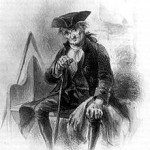Gavin and I ran into a strange transcription problem this week: how to match a book to the one-word entry “Knickerbottom” given for a loan on George Washington Arndt’s account? WorldCat has no matches; a Google search gives…well, no books published before 1811, let’s just say that.
Based on the cataloging number associated with the record, it turns out that the book the librarian was recording was Washington Irving’s breakthrough work, A History of New-York (1809), often referred to as Knickerbocker’s History after the fictional author-figure that Irving invented for the book and that would return in The Sketch-Book (1819) as the narrator of Irving’s most famous stories, “The Legend of Sleepy Hollow” and “Rip Van Winkle.”
Like those stories, which are almost the only American material in what is more or less a fictionalized travelogue of Europe, the ELC’s early loan records show Irving as one of the few popular American choices. Even in the first year of the library’s existence, the “Knickerbottom” record marked the second time that Arndt took out the book (signed for with a sloppy signature—19c readers would likely have connected it to the dissipated lifestyle that Arndt’s brother, Benjamin Franklin Arndt, accused his brother of leading in the family memoir), and Irving shows up in many of the other records in the first ledger as well.
This popularity in Easton was part of a wave that helped to cement both Irving and his cranky antiquarian, Diedrich Knickerbocker, as American icons, and the term “Knickerbocker” became synonymous for “New Yorker” with such tenacity that everything from a 19c literary magazine to NYC’s current NBA team have carried the name (yes, “Knicks” is short for “Knickerbockers”). But in 1811, nobody had heard of Diedrich Knickerbocker before, unless they were up on their belletristic reading, and the ELC’s librarians, who misspelled German names all over the place, were clearly having trouble with the Dutchified spelling of Irving’s character. At least the earlier entry had a more benign error: “Knickerbacker.” And now, we’ve gotten to the, er, bottom of this mystery.

